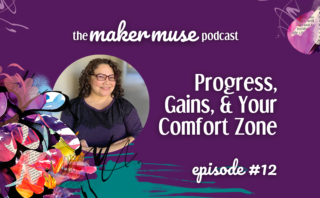Diet, cheer squads, and power tools: these are 3 more life lessons or universal truths that carry over from the gym to real life, to our artistic lives. But diet isn’t just what you eat, the cheer squad isn’t made up of the mean girls from high school, and what could possibly be the most powerful tool in your arsenal? Check out part 2 of this series, and stay tuned for part 3 which closes out Season 1 of The Maker Muse Podcast!
Please remember to subscribe, rate, and review The Maker Muse Podcast wherever you catch these episodes. ¡Muchas gracias!
Scroll down for a full episode transcript.
This post may contain affiliate links. For more information, please see my Disclosure Policy.*
In this episode:
- 0:25 – Sites to rate & review podcasts:
- 3:48 – Grab a free copy of the Destination: Innovation Roadmap
- 4:01 – Episode 7: Creativity is a Marathon, Not a Sprint
- 7:05 – Episode 8: 12 Tips to Recover from Creative Burnout
- 7:24 – Episode 10: Life Lessons from Weightlifting
Socialize online
Subscribe to the mailing list and follow The Maker Muse on:
Transcript
[00:05] Hola y welcome to The Maker Muse Podcast, the place where child-free Spanglish speaking mujeres fuertes are inspired to find their confidence through creativity. I’m Paulette Erato, the Maker Muse. This is part two of three in the universal lessons found in weightlifting series that we’re closing out season one of The Maker Muse Podcast with.
[00:30] I’m so happy you’re here. Before we dive into today’s topic, I’d like to ask a favor of you. If you’ve liked what you’ve heard so far, please give this a rating or review on Spotify or Apple. And if you’re not listening on either one of those, but still want to give some love, I’d appreciate it. So I’ll leave a list of other sites that you can do that on in the show notes. ¡Muchas gracias!
[00:52] Okay, so what are some universal truths or lessons that we can get from the gym? First, let’s recap. we talked about the privilege of being nuevito en algo to be a newbie, how to appropriately set your expectations so you can enjoy being new at stuff, and that rest breaks aren’t earned, they’re required. I also mentioned visualization, which will lead to another lesson on today’s list.
[01:15] All right. So now we’re all caught up. Let’s continue with three more life lessons slash universal truths from the weight room.
[01:23] The next lesson the rest of us can learn from weightlifters is around diet. Really dedicated lifters, have a strict diet they adhere to, and not just with food, but yeah, serious lifters can be pretty meticulous about what they put in their bodies. They track their macros. But they also make sure to drink a lot of water—as we all should. Why do you think I’m always telling you to stay hydrated? And they take their rest days seriously because you can’t lift if you don’t have energy. I mentioned this last time.
[01:51] But they also spend their entire workout time in a supportive environment. Everyone goes to the gym for different reasons. Some people lift, some do cardio, some are there for the group classes, but everyone is hopefully working out in their most supportive environment. Even the loud guy in the corner, grunting and growling like a freaking animal. He’s just lifting a lot of weight.
[02:13] So, what does that mean for the rest of us? Am I telling you to go load up on protein shakes? No, but they are delicious. I personally like a cheesecake one that’s getting harder and harder to find, but somehow there’s always the gross banana and strawberry one in stock.
[02:27] Anyway, the lesson the rest of us can get out of this is to be very aware of what your consumption looks like. Not just food, but what you consume with all your senses, what you watch and see as you’re scrolling through your phone, what you hear, what you smell, whether or not your environment supports your goals.
[02:45] I’m going to expand on this in the next lesson, but for now, let’s say that being surrounded by people who don’t support your goals will steal both your enthusiasm and motivation. And that sucks. So I want you to be aware of what you put in your body and by extension into your mind. Studies have shown over and over that scrolling through social media, like so many of us do in our free time, is actually detrimental to our health. Because we end up in a weird loop of comparing ourselves to what we’re seeing on the screen and then feeling bad about ourselves when we have no reason to. Because what you’re seeing is everyone else’s highlight reel, right? You’ve heard that term: people mostly post their highs and none of their lows. You can’t compare your everyday life to someone else’s greatest hits. No, that’s not how it works. We’re not usually posting the behind the scenes crap of every day. Right? The mundane shit. So why do we get caught up in this comparison shit show?
[03:37] We know it’s bad and yet we get sucked into it. So be very conscious when you do it. And maybe start limiting your time around doing that, set up some boundaries. So the lesson here is to be cognizant of what you ingest in your daily life, what you consume in terms of all your senses. Not just what you eat, but the type of music you listen to, the people you follow on social, the sights, sounds, smells, of your everyday world. Are they supporting your goals?
[04:07] The next lesson is to get a cheering squad. This is that support function I’ve talked about before. If you have my free Destination: Innovation Roadmap, then you already know about this technique. And if you want your own copy, I’ll leave a link in the show notes for where you can get it. But the next lesson is that life is easier when you’re surrounded by people who support you.
[04:25] Remember the episode on marathons and creativity? In it I also mentioned that having people who cheer you on in the middle of the hard parts of both running (or any kind of working out) and creating, helps keep you motivated and focused on finishing your projects. So you want to surround yourself with people who will provide that for you.
[04:43] Because if you’re surrounded with people who don’t believe in you, that energy is going to fuck you up. Not being supported for what you want to put your energy into sucks, and it makes you doubt yourself and it makes you not want to do the thing anymore. Like I said, it steals your enthusiasm and your motivation and your joy.
[05:01] So you might have to go out there and create your own support system. A community of people who know the struggles you might encounter is invaluable for overcoming them. This is why professional associations, artisan guilds, book clubs, running clubs, and so on exist. You want to surround yourself with people who not only support what you’re doing, but that you can geek out about it with.
[05:22] Here’s another example of gym life translating into real life. In the gym. You can always find a spotter, even if you’re lifting alone. What’s a spotter? That’s a person who will watch your lift and help out if you need to dump the weight, if you need an exit strategy. The Wikipedia definition of this is:” the act of supporting another person during a particular exercise with an emphasis on allowing the participant to lift or push more than they could normally do safely.” So a spotter is literally part of your support system.
[05:53] But you also need a cheering squad in your head. The ones that will drown out the inner critic, who is just afraid of you failing. I actually had to laugh out loud at myself in the middle of my squats the other day, because all of a sudden I heard my cheering squad in the middle of the set. I had two more squats to go. And honestly, I do not love squats, so I really need the cheering squad to get through them. And all of a sudden, a voice in my head starts going, “you can do it, 2 more…okay 1 more.” And I looked in the mirror and just laughed because clearly I needed it. But I was also thinking, “I’m going to have to share this on the episode” too. Because a positive mentality when doing something as hard as defying gravity is essential to your success. And if it works in the gym, it’ll work everywhere from the art studio to the boardroom. And when you feel good, you actually perform better.
[06: 44] This cheering squad technique is actually used by the Navy SEALs. They are trained not only in the physical quests that they have to conquer, but also in mental readiness. Because you can’t be the elite type of soldier that a Navy SEAL is, in the environments in which they operate, without having that mental grit, that mental toughness. So the secret to that is instead of having an inner critic in their heads, screaming at them,”I’m scared. This sucks. Let’s get the fuck out of here.” They have an inner cheering section that keeps them going. Because if they don’t, it’s very likely that someone’s gonna get killed. So if people under the most extreme types of duress use this skill to get through the most dangerous situations, you and me sitting on our asses, listening to this episode today? Yeah, we can do it too.
[07:32] So, how do you develop a cheering squad? Where do you find the people who will support you both inside and outside your head? I talked about this in the creative burnout episode: like weightlifting, all hobbies, have their communities, whether in person or online. Seek those out, especially if you’re first starting out. Find the people who you can ask even the most obvious questions. So you don’t have to make the same beginner mistakes someone else made. Or at least you’ll be aware that you might make them.
[08:01] Remember the last episode, part one? That everyone’s a newbie at one point? We’ve all been there. There’s actually this weird statistic that says that every day, about 10,000 adults, in the US alone, learn something for the very first time. Every day, you can be one of those 10,000 people learning something new. Because that means every day, 10,000 people are newbies. I’m telling you we’ve all been there and you are not alone.
[08:26] As for the cheering squad in your head, I like to start with creating some phrases that I need to hear. Like when I was at the gym the other day,”you can do it. It’s just one more.” And then I use them whenever I need them. I also try to think of a voice I’d like to hear. And my go-to example for this is James Earl Jones because he has a nice soothing voice. But I’m sure you can think of many more.
[08:48] Then you have to put your cheering squad through squad practice. So you repeat what you need to hear as often as possible, especially when you don’t need to hear it, so it becomes a habit. So that you wire your brain to use the pathways that’s creating. And when you find yourself in a situation that requires a squad, then they’re ready to go. Those new pathways are paved and solid, they’re ready to be used. And they’re ready for your neurons to travel through them and give you what you need.
[09:14] Continuing on that thought, the human mind is an incredibly powerful tool. It’s more powerful than the world’s strongest lifter, because your mind has the power to make you incredibly powerful. Or make you believe you are nothing. That’s gnarly, right?
[09:29] So the final lesson in this episode is that the mind is your biggest source of strength, your most powerful tool. There’s that old Henry Ford quote that goes, “whether you think you can, or you think you can’t, you’re right.” Meaning that that mind of yours has all the power. No matter how big your muscles get, your mind can still make you feel tiny and insignificant if you let it.
[09:51] So, how do you avoid that? First you make sure you’re limiting the bullshit that you let in there, right? You’re watching your consumption. Then you make sure you have a supportive environment and people who encourage you to keep excelling. And then you use your power tool.
[10:05] In the last episode, I mentioned visualization and sitting through your rest breaks, imagining what your next lift will feel like, what it’ll look like. And how that exercise helps you to actually commit and perform better the next time up to the bar. How imagining that you’re going through the lift, both from an observer’s point of view (like you’re watching a movie), but also in your body (so reliving that sensation as if you’re doing it) is a powerful exercise.
[10:30] Now let’s talk about how you can power your brain, your mind.
[10:35] Let me tell you a story about the time I thought I wasn’t athletic. I remember saying this to my mom around the age of 13, because I’d read somewhere that athlete’s brains were wired differently. And I’d convinced myself that my brain wasn’t like that. I was book smart. I could maybe play the piano a little bit. Not well, but I enjoyed it. So my brain, obviously wasn’t wired for sports.
[10:58] What I failed to recognize was that the article wasn’t saying that athlete’s brains come out of the box that way. They aren’t born that way. That wiring is made the same way that your thoughts and beliefs and skills are made. They are learned and then they are practiced until they become deeply ingrained neural pathways. Just like any art is a skill that can be learned, you can wire your brain to create the pathways you want.
[11:21] So back to me at 13 here, I am convinced my brain wasn’t meant for sports or athleticism. And yet the next year or so I started playing tennis. Not well, obviously because my brain wasn’t wired for it. But after that I got into swimming. Again, I wasn’t great, but I didn’t drown.
[11:38] After swimming came kickboxing, and then came weightlifting. And somewhere in between, there was also those two half marathons. Remember that episode? I might hate running, but I’ve had some good lessons out of that experience that I got to share with you.
[11:50] So I’m not an elite athlete in any of those sports. But that doesn’t matter. I’ve proved 13 year old me wrong over and over and over. I am a weight lifting chingona, and my brain didn’t suddenly rewire itself to become that overnight. First, I had to try to do the thing. Then I had to keep going back to do the thing over and over and over. And that’s how the brain is rewired into a new mindset. That’s how habits are formed.
[12:18] And that’s how beliefs are formed. Through this repetition the brain acquires proof of competency in the thing that you’re doing and then you gain confidence from that.
[12:29] And trust me when I tell you that confidence is super important when you’re lifting heavy. Like I mentioned at the top, if you don’t have confidence that you’re going to perform a lift, then you won’t. That bar can actually feel heavier when you have that mental load, that mental burden, on top of whatever weight you’re already trying to lift. Why would you do that to yourself? You can’t count those extra pounds, they don’t add to your PR. So you’re just actually making yourself worse at the thing that you’re trying to do.
[12:55] As a girl scout, I was taught that if you find yourself stuck out in the water and you’re wearing jeans, then you take those damn things off, you fill them with air so you can float. You don’t let your jeans wear you down. You don’t risk drowning because of a damn pair of jeans.
[13:10] So don’t let your mind add an additional burden, either to your lifts or to your day-to-day life. Because remember the mind is that powerful.
[13:19] I want you to think about that and how you can use it in your everyday lives. In your artistic pursuit, in your professional pursuits. What do you need to concentrate on in order to make your next big lift? Whether it’s getting through the commute today or getting that promotion next month? I want you to sit and visualize it happening both, like I mentioned, in your body and as if you’re watching it on TV.
[13:41] Practice that. And then let me know how it works for you. You know I love hearing from you, so just DM me or email me. The links are always in the show notes, and then we can talk about it.
[13:51] I could go on and on about this because there’s so much great science around this concept and you know how I love science and art together. But this episode is already long enough. So I will just say that we will continue this next time, because part three is all about progress. I’m going to break it down into three more life lessons that we can all get from weightlifting. But in the meantime, let’s recap.
[14:13] Three more universal truths that we can get from weightlifting are: one, be very aware of what you are consuming. Two, get a cheering squad. Make sure that you are in a supportive environment so you too can be successful at the things you want to do. And three, do not forget that your mind is powerful and you can either add a mental burden to your lifts, or you can remove one.
[14:36] And that’s it! Until next time mis amiges: stay hydrated and that’s a burrito!




